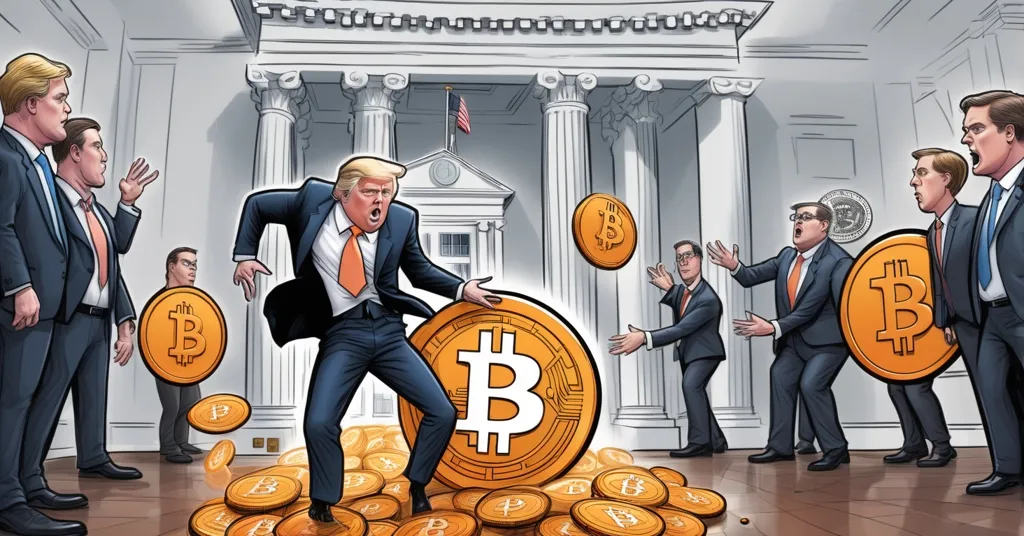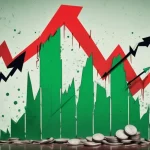XRP Lobbyist’s Truth Social Post Sparks White House Ban on Ballard Meetings

Ripple-Linked XRP Lobbyist Behind Truth Social Post Purged from White House
A lobbyist from Brian Ballard’s firm, linked to Ripple Labs and the XRP token, posted a viral message on Truth Social about a “Crypto Strategic Reserve,” triggering a significant XRP price surge. The White House responded by purging the lobbyist and banning meetings with Ballard, underscoring the tension between cryptocurrency lobbying and government policy.
- Lobbyist from Brian Ballard’s firm behind viral Truth Social post
- Post proposed “Crypto Strategic Reserve,” causing XRP price spike
- Ripple Labs, linked to XRP, a client of Ballard Partners
- U.S. government clarified Bitcoin-only strategic reserve
- White House purged lobbyist, banned meetings with Ballard
The Incident
When a lobbyist from Brian Ballard’s firm, Ballard Partners, posted on Truth Social about a “Crypto Strategic Reserve” that included XRP and other altcoins, the crypto world took notice. A “Crypto Strategic Reserve” refers to a government-held stash of cryptocurrencies intended for strategic use, while “altcoins” are cryptocurrencies other than Bitcoin. The post quickly went viral, leading to a significant spike in XRP’s price. However, the excitement was short-lived as the White House clarified that the U.S. government would only establish a Bitcoin-only strategic reserve, with other cryptocurrencies considered for a separate “stockpile.” This move reflects the government’s preference for Bitcoin, often seen as “digital gold,” over other cryptocurrencies.
While some might argue the lobbyist’s post was a harmless attempt to promote XRP, others see it as a dangerous overstep in influencing government policy. The lobbyist probably didn’t expect their post to go viral faster than a meme about a cat playing the piano, but the consequences were swift and severe.
Ripple Labs and Ballard Partners
Ripple Labs, the enterprise blockchain company behind XRP, hired Ballard Partners in November 2023, spending $940,000 in lobbying efforts that year. This move was part of a broader strategy to influence cryptocurrency policy, particularly in the Securities & Investment sector. The connection between Ripple Labs and Ballard Partners underscores the ongoing battle between the cryptocurrency industry and regulatory bodies, as the crypto lobbyists attempt to sway policy in their favor.
Ballard Partners, known for its connections to the Trump administration, also represents other clients like JPMorgan and Kraken. The firm’s influence in Washington, D.C., has been significant, but the Truth Social post seems to have pushed the White House over the edge. Can a single social media post really influence government policy? In this case, it certainly did.
Broader Implications
The incident with the viral post and the subsequent White House actions highlight the broader implications of lobbying in the cryptocurrency sector. It underscores the need for transparency and accountability in how lobbying influences policy and market dynamics. The U.S. government’s decision to establish a Bitcoin-only strategic reserve could be seen as a nod to Bitcoin’s role as a store of value and its potential in national strategy. This move might encourage other nations to consider similar reserves, potentially impacting global cryptocurrency policies.
Meanwhile, the exclusion of XRP and other altcoins from the strategic reserve could have long-term implications for their valuation and regulatory treatment. While the decision aligns with Bitcoin maximalist views, it’s important to recognize that altcoins play unique roles in the crypto ecosystem, filling niches that Bitcoin itself may not serve.
The broader context of cryptocurrency lobbying in Washington, D.C., reveals a complex landscape where influential firms like Ballard Partners navigate the delicate balance between promoting their clients’ interests and respecting government boundaries. The incident also highlights the potential risks associated with such lobbying strategies, especially when they involve controversial cryptocurrencies like XRP.
Key Takeaways and Questions
- What was the content of the viral Truth Social post?
The post proposed a “Crypto Strategic Reserve” and mentioned XRP and other altcoins, causing a significant price spike in XRP.
- Who was behind the Truth Social post?
A lobbyist from Brian Ballard’s firm, which represents Ripple Labs and other clients.
- What was the impact of the post on XRP’s price?
The post led to a significant price spike in XRP.
- What is the relationship between Ripple Labs and Ballard Partners?
Ripple Labs is a client of Ballard Partners, having hired them in November.
- What action did the White House take following the incident?
The White House purged the lobbyist and banned officials from meeting with Ballard.
- What did the U.S. government clarify regarding the strategic reserve?
The U.S. government clarified that it would establish a Bitcoin-only strategic reserve, while other cryptocurrencies would be part of a separate “stockpile.”
- Why was the Truth Social post significant for the White House’s decision?
The post was the “tipping point” in the White House’s growing dissatisfaction with Ballard.



